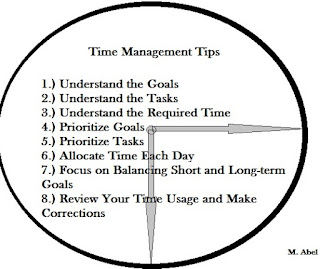Time is an expendable resources that has limitations
and adds up to either contribute or detract from a company’s success. You may
have heard the phrase time is money. In business few things could be truer. The
way in which managers use their time can have large implications for whether or
not activities are aligned to the actual needs of the company. Time management
isn’t a fruitless event and can lead to greater personal and organizational
rewards.
Managing time and knowing where to spend time are two
important considerations. Someone can be efficient with every moment of their
life but if they are spending their time in the wrong activities it doesn’t do
them much good. Likewise, on an organizational level percentages of time can
lead to thousands, if not millions, of dollars of revenue.
Distraction
of the Available:
It is easy for managers to get distracted in the small
everyday tasks they must complete each day. The reports, daily events, and
employee concerns keep them jumping from one task to the next in order to
finish the day. It is like a running hamster wheel where lots of things are
getting done but few of them actually contribute to the organization.
Instead of being reactive with time it is important to
be more proactive in its use. This includes keeping the bigger function of the
organization and the department in mind when spending time. Sometimes it is
better to adjust tasks, streamline processes, or simply delegate some necessary
“busy work” to ensure that focus is maintained on the objectives.
Over
Abundance of Procedures:
The manager’s job is not in isolation and often must
take into account the needs of customers, suppliers, bosses, human resources,
industry stakeholders, etc… At times organizations may develop too many rules
and processes that make functional operation of the department ineffective.
There are simply too many details that must be accomplished every day before
productivity begins.
This is something that is difficult for executives to
understand because in their search for greater control the actual time the manager
has left to focus on his/her core job functions becomes limited. The manager must choose between pleasing their
boss and meeting organizational goals. Sometimes the choice can become
impossible to make when pressures are high.
Time management is not always something that rests
with the individual manager’s use of time. In many scenarios it can be the
actual policies, procedures, and misalignment of duties that cause managers not
to be focused. As these managers spend more time on organizational objectives
they naturally are better able to reach important company milestones.
Executives should seek to simplify, streamline, and focus duties instead of
creating complexity.
